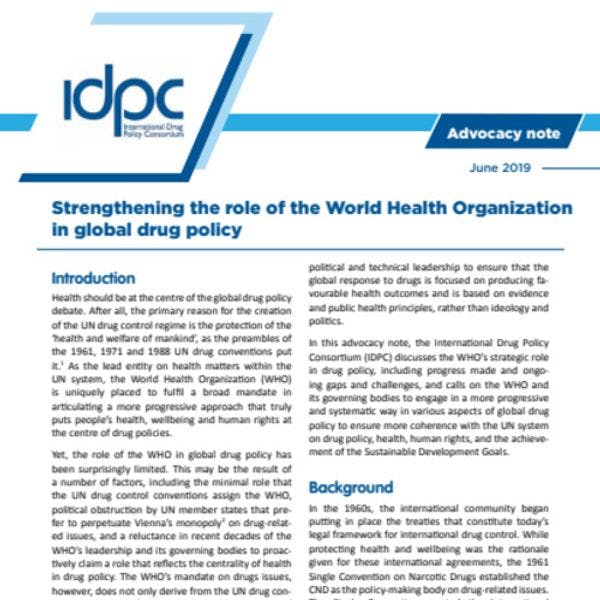Fortalecimiento del papel de la Organización Mundial de la Salud en la política mundial sobre drogas
El IDPC insta a la OMS y a sus órganos rectores a que participe de manera más progresista y sistemática en diversos aspectos de la política mundial de drogas. Más información, en inglés, está disponible abajo.
Health should be at the centre of the global drug policy debate. After all, the primary reason for the creation of the UN drug control regime is the protection of the ‘health and welfare of mankind’, as the preambles of the 1961, 1971 and 1988 UN drug conventions put it. As the lead entity on health matters within the UN system, the World Health Organization (WHO) is uniquely placed to fulfil a broad mandate in articulating a more progressive approach that truly puts people’s health, wellbeing and human rights at the centre of drug policies.
Yet, the role of the WHO in global drug policy has been surprisingly limited. This may be the result of a number of factors, including the minimal role that the UN drug control conventions assign the WHO, political obstruction by UN member states that prefer to perpetuate Vienna’s monopoly on drug-related issues, and a reluctance in recent decades of the WHO’s leadership and its governing bodies to proactively claim a role that reflects the centrality of health in drug policy. The WHO’s mandate on drugs issues, however, does not only derive from the UN drug conventions, but also from its role as the lead agency of the UN on health, and its own Constitution.
In this advocacy note, IDPC discusses the WHO’s strategic role in drug policy, including progress made and ongoing gaps and challenges, and calls on the WHO and its governing bodies to engage in a more progressive and systematic way in various aspects of global drug policy to ensure more coherence with the UN system on drug policy, health, human rights, and the achievement of the Sustainable Development Goals.
Descargas
Temas
Regiones
Perfiles relacionados
- International Drug Policy Consortium (IDPC)
